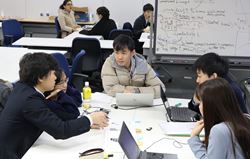News from Asia and the Pacific
Japan-based Graduate Students Enjoy Mock Surveillance at IMF Training Program
January 10, 2020, Tokyo, Japan - Thanks to an overnight training course offered by the IMF Regional Office for Asia and the Pacific (OAP), more than 30 youths, mainly graduate students from Asia, Africa and Europe, today acted as economists and presented macroeconomic policy advice for Brazil, Italy and South Korea at a mock surveillance exercise.
The session was the highlight of the 8th Macroeconomist Training Program, organized in collaboration with the Japan International Cooperation Agency (JICA), to offer lectures on how IMF economists conduct surveillance of its member countries.
 During the two-day training, 21 students convened at the JICA Tokyo Center to hear an overview of the IMF’s macroeconomic framework and its application to the case studies of Turkey and Mongolia from a retired IMF economist, Jerald Schiff, who currently teaches at universities both in the US and Japan. The lecture was for the first time telecast live to Hiroshima University where 14 graduate students of Prof. Makoto Kakinaka participated remotely.
During the two-day training, 21 students convened at the JICA Tokyo Center to hear an overview of the IMF’s macroeconomic framework and its application to the case studies of Turkey and Mongolia from a retired IMF economist, Jerald Schiff, who currently teaches at universities both in the US and Japan. The lecture was for the first time telecast live to Hiroshima University where 14 graduate students of Prof. Makoto Kakinaka participated remotely.
Following lectures on the Fund’s economic analysis framework, known as the Financial Programming and Policy (FPP) framework, and its application to bilateral surveillance, the participants were grouped into 5 different teams, tasked to analyze the economy of one of three countries as a team, and worked overnight to formulate their policy advice.
 On the second day, the five teams made group presentations on their policy advice, engaging in lively discussions to present different views and advice, particularly as two teams each worked on Brazil and Italy. In the case of Brazil, which has accumulated high government debt, for example, one team recommended cutting pension funds for better debt sustainability while another team advised more fiscal stimulus to support economic growth and tax revenue. The Hiroshima team presented its case study on Korea remotely.
On the second day, the five teams made group presentations on their policy advice, engaging in lively discussions to present different views and advice, particularly as two teams each worked on Brazil and Italy. In the case of Brazil, which has accumulated high government debt, for example, one team recommended cutting pension funds for better debt sustainability while another team advised more fiscal stimulus to support economic growth and tax revenue. The Hiroshima team presented its case study on Korea remotely.
 The participants appreciated the opportunity to emulate IMF economists. “I really enjoyed the lectures on financial programming design, as this is a great insight into IMF's way of looking at the economy,” said Bastien Guilleminot-Simon of France, who studies at the University of Tokyo. Others also found the case studies useful for their future studies and professional work. “I learned a lot about the assessment process based on macroeconomic indicators,” said Quang Thanh Tran, a Vietnamese student from Tohoku University. “Normally if I see a table full of data, it’s quite difficult to know where to start but by attending this workshop, I now know at least where to start!”
The participants appreciated the opportunity to emulate IMF economists. “I really enjoyed the lectures on financial programming design, as this is a great insight into IMF's way of looking at the economy,” said Bastien Guilleminot-Simon of France, who studies at the University of Tokyo. Others also found the case studies useful for their future studies and professional work. “I learned a lot about the assessment process based on macroeconomic indicators,” said Quang Thanh Tran, a Vietnamese student from Tohoku University. “Normally if I see a table full of data, it’s quite difficult to know where to start but by attending this workshop, I now know at least where to start!”
The Macroeconomist Training Program is an OAP initiative for youth to raise their understanding of the IMF’s work and improve their knowledge of economic analysis and policy advice. OAP previously organized seven such training courses, from which more than 140 students from 26 different countries benefitted. The training course serves as an introductory course to the IMF’s online courses offered by the IMF’s Institute for Capacity Development (ICD). The next training program is scheduled to run in early March.





